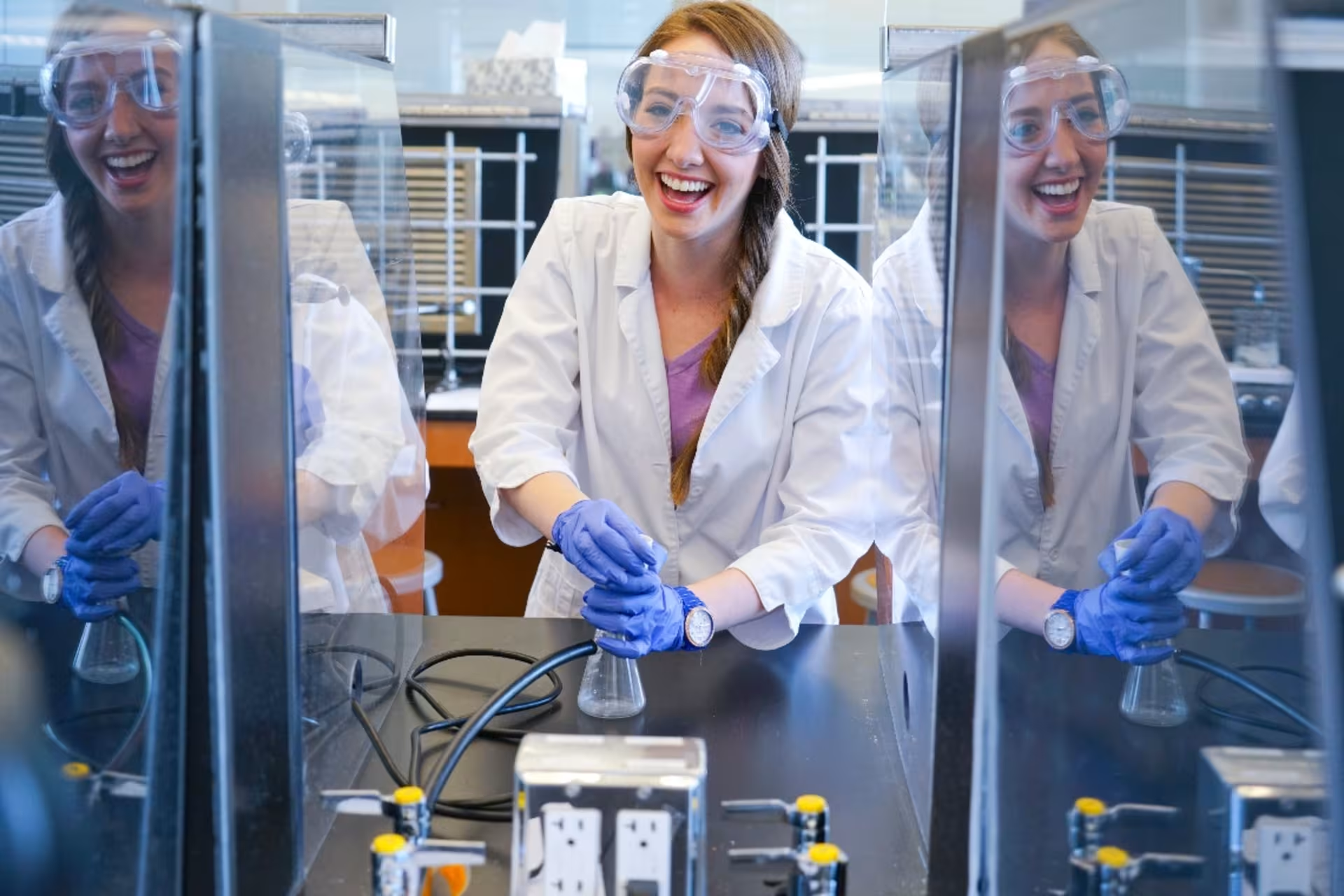
Bachelor of Science in Chemistry
Practice Fundamental Chemistry Skills With a Bachelor’s Degree in Chemistry
Chemical sciences have shaped modern society. Scientific advancements in this field influence many aspects of everyday life, and behind these advancements is a team of chemists and chemical engineers. If you’re interested in having the opportunity to change the world around you and improving the lives of people in your community, consider applying to the Bachelor of Science (BS) in Chemistry degree program at Grand Canyon University.

Campus: $8,250 per semester [More Info]
Up to 90 credits, only 84 can be lower division
Credits: Fill out the Lopes Eval to find out what will transfer
Admission Requirements (Bachelor's)
- 16+ years old
- High School Graduate
- 3.0+ Unweighted GPA
OR 2.5+ Unweighted GPA and
- ACT: 19
- SAT: 1000*
Admission requirements may differ based on degree level, program and modality, or transfer status. Some programs of study may require a higher GPA and/or other qualifying criteria for admission. Please review full admission and program requirements in the University Policy Handbook.
*Math and reading only on a 1600 point scale (test date after 3/1/2016). SAT score of 1380 required for 2400 point scale (test date before 3/1/2016).
Earn Your BS in Chemistry at GCU
Offered by the College of Natural Sciences, the bachelor’s in chemistry degree provides you with a foundation for understanding scientific processes. In this program, you’ll be taught to design scientifically sound experiments to test hypotheses, understand the properties of matter and explore the behavior of matter during chemical reactions. Learn to present your research and ideas through various modes of communication.
As a private Christian university, GCU emphasizes the role of ethical decision-making within the scientific field. The BS in Chemistry degree analyzes the roles and responsibilities of future professions in light of ethical considerations and matters of morality.
The curriculum for this degree aligns with the guidelines established by the American Chemical Society (ACS). The ACS is a nonprofit organization that empowers scientists and educators for the betterment of chemistry innovation, research and education across the globe.

BS in Chemistry Course Topics
Careers in science and technology present many possibilities for graduates who have earned a bachelor’s degree in chemistry. During your undergraduate scientific studies at GCU, you will be taught professional skills and foundational scientific knowledge that may be necessary to pursue your future ambitions. Develop knowledge in chemical science and through faith-integrated courses and focus on your studies through the lens of the Christian perspective. You will be taught to consider the principles of environmental and ecological responsibility, humanitarianism and social issues as you study the chemical sciences.
Bachelor’s Degree in Chemistry Core Competencies
In courses such as Principles of Biochemistry, Critical Analyses in Science and Organic Chemistry, bachelor’s in chemistry degree students work to acquire the following core competencies:
In the last part of the program, you are required to complete the Capstone Project in the Sciences. This is a culmination of your learning experiences, during which you will prepare an extensive scientific report or proposal on a topic in the chemical sciences.
Career Opportunities With a Bachelor’s Degree in Chemistry
Some graduates may pursue work in hospital research laboratories, universities or government agencies. Others may choose to work in fields such as biotechnology, or to pursue biomedical, pharmaceutical, chemical or environmental research specializations. Advanced opportunities may require a graduate degree. Some career paths, such as jobs in the healthcare field, may require additional academic qualifications, licensure and certifications as well.
Some specific jobs that may be related to a BS in Chemistry include the following:
Chemists
Chemical technicians
Forensic science technicians
Food science technicians
Natural sciences managers
Chemistry teachers
Median annual wage for chemists and materials scientists as of May 2021(See disclaimer 1)
Bachelor of Science in Chemistry Degree FAQs
If you’re passionate about chemistry and are looking to earn your bachelor’s degree, read through our frequently asked questions to learn more.
What’s the differences between a BA and a BS in Chemistry?
Are mathematics required for a Bachelor of Science in Chemistry?
Is a Bachelor of Science in Chemistry degree worth it?
How difficult is a bachelor’s degree in chemistry?
Program Curriculum
General Education Requirements
Required General Education Courses
Core Courses

If you are interested in pursuing a career in chemistry, apply for enrollment in GCU’s bachelor’s in chemistry degree. Complete the form on this page to get started.
- The earnings referenced were reported by the U.S. Bureau of Labor Statistics (“BLS”), Chemists and Materials Scientists as of May 2021, retrieved on May 5, 2023. Due to COVID-19, data from 2020 and 2021 may be atypical compared to prior years. The pandemic may also impact the predicted future workforce outcomes indicated by the BLS. BLS calculates the median using salaries of workers from across the country with varying levels of education and experience and does not reflect the earnings of GCU graduates as chemists and materials scientists. It does not reflect earnings of workers in one city or region of the country. It also does not reflect a typical entry-level salary. Median income is the statistical midpoint for the range of salaries in a specific occupation. It represents what you would earn if you were paid more money than half the workers in an occupation, and less than half the workers in an occupation. It may give you a basis to estimate what you might earn at some point if you enter this career. You may also wish to compare median salaries if you are considering more than one career path. Grand Canyon University can make no guarantees on individual graduates’ salaries as the employer the graduate chooses to apply to, and accept employment from, determines salary not only based on education, but also individual characteristics and skills and fit to that organization (among other categories) against a pool of candidates.


